Bob Dylan
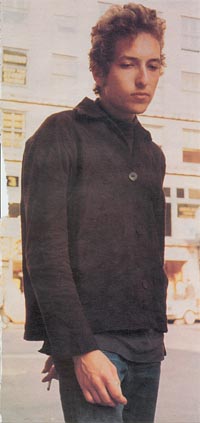 Anything that I could say about the affect that Bob Dylan's music had on my life would be an understatement. If you don't mind very much, I prefer to remember Dylan as he looked in the early 60's, not the way he looks today. I know that's pretty much irrelevant to the music, but "I was so much older then, I'm younger than that now".
Anything that I could say about the affect that Bob Dylan's music had on my life would be an understatement. If you don't mind very much, I prefer to remember Dylan as he looked in the early 60's, not the way he looks today. I know that's pretty much irrelevant to the music, but "I was so much older then, I'm younger than that now".
I think that just about everything that can be said, has been said, so all I'm going to do is tell a little bit about my own personal experiences with Dylan and his music.
I came to New York City in September, 1961, just about 8 months after Dylan first arrived in January, 1961. I first saw Dylan in person in the fall of 1961 at
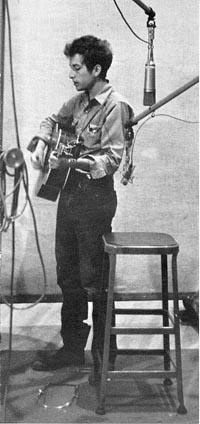 Gerde's Folk City. I don't remember where it was exactly, I think it was on 4th street. I remember that the stage was on the left when you walked in and the bar was on the right. You sat on wooden chairs at long tables. It was kind of shabby, as I recall. Dylan was at the bar and he looked a little drunk. Those were the days when you could drink at 18, but I was still only 17. They had these Japanese cowboys on that were singing country songs. Dylan went on very late, and he sang the most god-awful version of "House of the Rising Sun". As I recall, the audience booed him. A few months later, I was looking through the Times and I saw a small ad for, guess what?
Bob Dylan in Concert...At CARNEGIE HALL!! I said to myself, what the hell is this? Could this be the same guy I saw booed off the stage at Gerdes? So I bought tickets to see Peter, Paul and Mary, with what little money I had. Joan Baez had already become very popular, but she didn't do too many shows in New York.
Gerde's Folk City. I don't remember where it was exactly, I think it was on 4th street. I remember that the stage was on the left when you walked in and the bar was on the right. You sat on wooden chairs at long tables. It was kind of shabby, as I recall. Dylan was at the bar and he looked a little drunk. Those were the days when you could drink at 18, but I was still only 17. They had these Japanese cowboys on that were singing country songs. Dylan went on very late, and he sang the most god-awful version of "House of the Rising Sun". As I recall, the audience booed him. A few months later, I was looking through the Times and I saw a small ad for, guess what?
Bob Dylan in Concert...At CARNEGIE HALL!! I said to myself, what the hell is this? Could this be the same guy I saw booed off the stage at Gerdes? So I bought tickets to see Peter, Paul and Mary, with what little money I had. Joan Baez had already become very popular, but she didn't do too many shows in New York.
I don't remember exactly when "Freewheelin'" came out, but it was the first Dylan album that I bought. I was totally blown away by it. I had never heard anything quite like it before. I readily identified with the cover showin' him walking down Waverly Place, since I walked down that same block every day going to school at NYU. For those of you who might not know it, the girl is Suze Rotolo, his girlfriend.
 After that, I bought the first album, "Bob Dylan", which I considered a disappointment. The songs on "Freewheelin'" are just light years ahead. My favorites were "Bob Dylan's Blues", "Bob Dylan's Dream" and "I Shall Be Free". of course, the other songs were wonderful too. I liked "Don't Think Twice It's All Right" and "Masters of War" as well. The only song on this album that I really didn't care for was "Down The Highway".
About that time, I think probably 1962, I used to see Dylan around the Village (Greenwich Village, that is) especially at the Hotel Earle. I used to stay at the Earle occasionally when I had a few dollars extra, or when I was entertaining a young lady. Dylan used to stay at the Earle a lot, and I remember seeing him and Joan there once or twice. I remember one afternoon seeing them both at a window upstairs, looking out.
The Hotel Earle was on Waverly Place, I think, but on the west side of the park, towards 6th Avenue.
After that, I bought the first album, "Bob Dylan", which I considered a disappointment. The songs on "Freewheelin'" are just light years ahead. My favorites were "Bob Dylan's Blues", "Bob Dylan's Dream" and "I Shall Be Free". of course, the other songs were wonderful too. I liked "Don't Think Twice It's All Right" and "Masters of War" as well. The only song on this album that I really didn't care for was "Down The Highway".
About that time, I think probably 1962, I used to see Dylan around the Village (Greenwich Village, that is) especially at the Hotel Earle. I used to stay at the Earle occasionally when I had a few dollars extra, or when I was entertaining a young lady. Dylan used to stay at the Earle a lot, and I remember seeing him and Joan there once or twice. I remember one afternoon seeing them both at a window upstairs, looking out.
The Hotel Earle was on Waverly Place, I think, but on the west side of the park, towards 6th Avenue.
Of course, the vigil then began for the next album. I remember calling Columbia several times to find out when it would come out. I just couldn't get enough of Dylan.
I was hoping that "Talking John Birch" would be on the next album, but it wasn't. I was becoming more and more radical in my politics and was active in the SANE group whose goal was to stop nuclear war. This song was just perfect for my emerging political awareness.
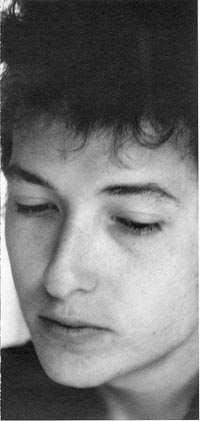 Sometime in late '62 or early '63, I went to see Dylan again. It was probably the Mosque Theater in New Jersey, or it might have been the White Plains Center. Anyway, I hadn't heard "Times They Are A-Changin" yet and the album hadn't come out yet. I wasn't prepared for what happened that night. It was almost a religious experience. Dylan started to sing "Come gather round people, wherever you roam..." and a roar went up from the crowd. With each chorus, the roar got louder. "Come writers and critics who prophesize with your pens..." Holy Shit!! "Come Senators, Congressmen
please heed the call..." Everyone was standing up. "Come mothers and fathers throughout the land, and don't criticize what you can't understand. Your sons and your daughters are beyond your command. Your old road is rapidly aging'. Please get out of the new one if you can't lend a hand...". I thought the place was going to explode. He was saying EXACTLY what I had been thinking. A bond was forged at that moment that remains to this day. I remember looking over at the girl that I had brought with me. I think her name was Charlene. She just didn't get it.
Sometime in late '62 or early '63, I went to see Dylan again. It was probably the Mosque Theater in New Jersey, or it might have been the White Plains Center. Anyway, I hadn't heard "Times They Are A-Changin" yet and the album hadn't come out yet. I wasn't prepared for what happened that night. It was almost a religious experience. Dylan started to sing "Come gather round people, wherever you roam..." and a roar went up from the crowd. With each chorus, the roar got louder. "Come writers and critics who prophesize with your pens..." Holy Shit!! "Come Senators, Congressmen
please heed the call..." Everyone was standing up. "Come mothers and fathers throughout the land, and don't criticize what you can't understand. Your sons and your daughters are beyond your command. Your old road is rapidly aging'. Please get out of the new one if you can't lend a hand...". I thought the place was going to explode. He was saying EXACTLY what I had been thinking. A bond was forged at that moment that remains to this day. I remember looking over at the girl that I had brought with me. I think her name was Charlene. She just didn't get it.
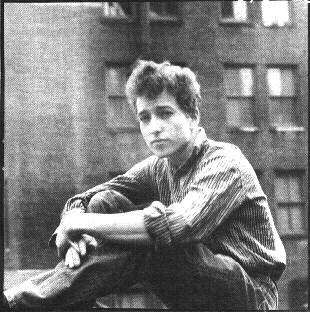 I recall going to another Dylan concert on Halloween night in October 1964. It was at Philharmonic Hall and as usually happened, Joan Baez was there and she and Dylan sang a couple of songs, one of which was "It Ain't Me, Babe". I remember that Dylan said something like "It must be Halloween, I'm wearin' my Bob Dylan mask." A few lucky people got to sit right on the stage, since they needed more seats and set up folding chairs on both sides of the stage.
I recall going to another Dylan concert on Halloween night in October 1964. It was at Philharmonic Hall and as usually happened, Joan Baez was there and she and Dylan sang a couple of songs, one of which was "It Ain't Me, Babe". I remember that Dylan said something like "It must be Halloween, I'm wearin' my Bob Dylan mask." A few lucky people got to sit right on the stage, since they needed more seats and set up folding chairs on both sides of the stage.
One concert that I remember very well was at Forest Hills tennis stadium, probably in 1965. I had gotten married in July 1965 (not to Charlene!) and my wife was pregnant, so my daughter Wendy went to her first Dylan concert in utero. It was freezing cold that night, although it was probably august. When Dylan brought out the band with their electric guitars, everyone booed. He waited a minute or two and then very softly said "Aw, come'on guys". He then launched into a powerful rendition of "Ballad of a Thin Man". "you try so hard, but you just don't understand...cause something is happening here, but you don't know what it is, do you, Mr. Jones? I thought that it was a perfect seque to what was happening. A few weeks (months?) later, I was listening to the radio and I heard "Positively 4th Street" for the first time. I was convinced that he wrote it in response to what had happened to him. He denies it, but I'll always believe that it was aimed at those who criticized his going electric. "You've got a lot of nerve, to say you are my friend..."
It was perfect.
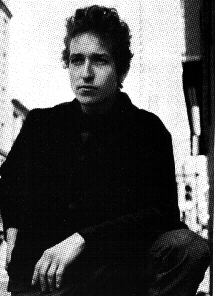
Some people probably think that "Blonde on Blonde" was Dylan's first album. There are probably others who think it was his last album. I don't advocate either of those extremes, but I will say with certainty that the period from 1961 to 1966 stands out in my mind as a watershed period in my life and in Dylan's musical career. Dylan writes on the liner notes to "Times They Are A-Changin":
" there's a movie called
"Shoot The Piano Player"
the last line proclamin
"music, man, that's where it's at"
it is a religious line
outside, the chimes rung
an they
are still ringin"
Indeed they are...
Back to Home page
 Gerde's Folk City. I don't remember where it was exactly, I think it was on 4th street. I remember that the stage was on the left when you walked in and the bar was on the right. You sat on wooden chairs at long tables. It was kind of shabby, as I recall. Dylan was at the bar and he looked a little drunk. Those were the days when you could drink at 18, but I was still only 17. They had these Japanese cowboys on that were singing country songs. Dylan went on very late, and he sang the most god-awful version of "House of the Rising Sun". As I recall, the audience booed him. A few months later, I was looking through the Times and I saw a small ad for, guess what?
Bob Dylan in Concert...At CARNEGIE HALL!! I said to myself, what the hell is this? Could this be the same guy I saw booed off the stage at Gerdes? So I bought tickets to see Peter, Paul and Mary, with what little money I had. Joan Baez had already become very popular, but she didn't do too many shows in New York.
Gerde's Folk City. I don't remember where it was exactly, I think it was on 4th street. I remember that the stage was on the left when you walked in and the bar was on the right. You sat on wooden chairs at long tables. It was kind of shabby, as I recall. Dylan was at the bar and he looked a little drunk. Those were the days when you could drink at 18, but I was still only 17. They had these Japanese cowboys on that were singing country songs. Dylan went on very late, and he sang the most god-awful version of "House of the Rising Sun". As I recall, the audience booed him. A few months later, I was looking through the Times and I saw a small ad for, guess what?
Bob Dylan in Concert...At CARNEGIE HALL!! I said to myself, what the hell is this? Could this be the same guy I saw booed off the stage at Gerdes? So I bought tickets to see Peter, Paul and Mary, with what little money I had. Joan Baez had already become very popular, but she didn't do too many shows in New York.
 Anything that I could say about the affect that Bob Dylan's music had on my life would be an understatement. If you don't mind very much, I prefer to remember Dylan as he looked in the early 60's, not the way he looks today. I know that's pretty much irrelevant to the music, but "I was so much older then, I'm younger than that now".
Anything that I could say about the affect that Bob Dylan's music had on my life would be an understatement. If you don't mind very much, I prefer to remember Dylan as he looked in the early 60's, not the way he looks today. I know that's pretty much irrelevant to the music, but "I was so much older then, I'm younger than that now".
 After that, I bought the first album, "Bob Dylan", which I considered a disappointment. The songs on "Freewheelin'" are just light years ahead. My favorites were "Bob Dylan's Blues", "Bob Dylan's Dream" and "I Shall Be Free". of course, the other songs were wonderful too. I liked "Don't Think Twice It's All Right" and "Masters of War" as well. The only song on this album that I really didn't care for was "Down The Highway".
About that time, I think probably 1962, I used to see Dylan around the Village (Greenwich Village, that is) especially at the Hotel Earle. I used to stay at the Earle occasionally when I had a few dollars extra, or when I was entertaining a young lady. Dylan used to stay at the Earle a lot, and I remember seeing him and Joan there once or twice. I remember one afternoon seeing them both at a window upstairs, looking out.
The Hotel Earle was on Waverly Place, I think, but on the west side of the park, towards 6th Avenue.
After that, I bought the first album, "Bob Dylan", which I considered a disappointment. The songs on "Freewheelin'" are just light years ahead. My favorites were "Bob Dylan's Blues", "Bob Dylan's Dream" and "I Shall Be Free". of course, the other songs were wonderful too. I liked "Don't Think Twice It's All Right" and "Masters of War" as well. The only song on this album that I really didn't care for was "Down The Highway".
About that time, I think probably 1962, I used to see Dylan around the Village (Greenwich Village, that is) especially at the Hotel Earle. I used to stay at the Earle occasionally when I had a few dollars extra, or when I was entertaining a young lady. Dylan used to stay at the Earle a lot, and I remember seeing him and Joan there once or twice. I remember one afternoon seeing them both at a window upstairs, looking out.
The Hotel Earle was on Waverly Place, I think, but on the west side of the park, towards 6th Avenue.
 Sometime in late '62 or early '63, I went to see Dylan again. It was probably the Mosque Theater in New Jersey, or it might have been the White Plains Center. Anyway, I hadn't heard "Times They Are A-Changin" yet and the album hadn't come out yet. I wasn't prepared for what happened that night. It was almost a religious experience. Dylan started to sing "Come gather round people, wherever you roam..." and a roar went up from the crowd. With each chorus, the roar got louder. "Come writers and critics who prophesize with your pens..." Holy Shit!! "Come Senators, Congressmen
please heed the call..." Everyone was standing up. "Come mothers and fathers throughout the land, and don't criticize what you can't understand. Your sons and your daughters are beyond your command. Your old road is rapidly aging'. Please get out of the new one if you can't lend a hand...". I thought the place was going to explode. He was saying EXACTLY what I had been thinking. A bond was forged at that moment that remains to this day. I remember looking over at the girl that I had brought with me. I think her name was Charlene. She just didn't get it.
Sometime in late '62 or early '63, I went to see Dylan again. It was probably the Mosque Theater in New Jersey, or it might have been the White Plains Center. Anyway, I hadn't heard "Times They Are A-Changin" yet and the album hadn't come out yet. I wasn't prepared for what happened that night. It was almost a religious experience. Dylan started to sing "Come gather round people, wherever you roam..." and a roar went up from the crowd. With each chorus, the roar got louder. "Come writers and critics who prophesize with your pens..." Holy Shit!! "Come Senators, Congressmen
please heed the call..." Everyone was standing up. "Come mothers and fathers throughout the land, and don't criticize what you can't understand. Your sons and your daughters are beyond your command. Your old road is rapidly aging'. Please get out of the new one if you can't lend a hand...". I thought the place was going to explode. He was saying EXACTLY what I had been thinking. A bond was forged at that moment that remains to this day. I remember looking over at the girl that I had brought with me. I think her name was Charlene. She just didn't get it.
 I recall going to another Dylan concert on Halloween night in October 1964. It was at Philharmonic Hall and as usually happened, Joan Baez was there and she and Dylan sang a couple of songs, one of which was "It Ain't Me, Babe". I remember that Dylan said something like "It must be Halloween, I'm wearin' my Bob Dylan mask." A few lucky people got to sit right on the stage, since they needed more seats and set up folding chairs on both sides of the stage.
I recall going to another Dylan concert on Halloween night in October 1964. It was at Philharmonic Hall and as usually happened, Joan Baez was there and she and Dylan sang a couple of songs, one of which was "It Ain't Me, Babe". I remember that Dylan said something like "It must be Halloween, I'm wearin' my Bob Dylan mask." A few lucky people got to sit right on the stage, since they needed more seats and set up folding chairs on both sides of the stage.
